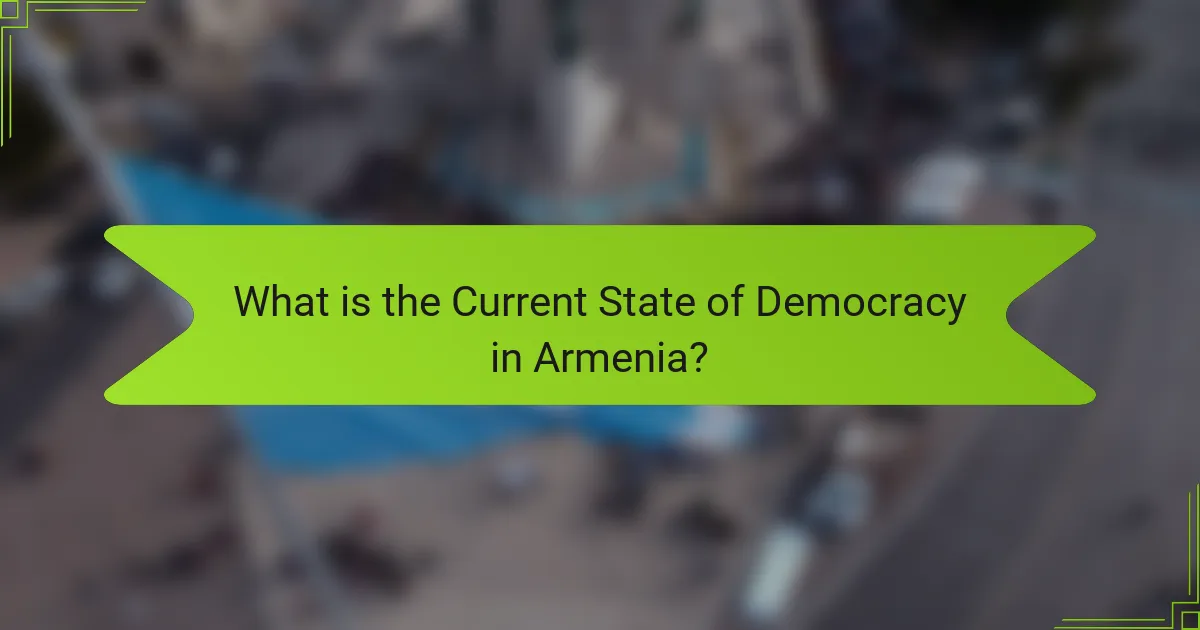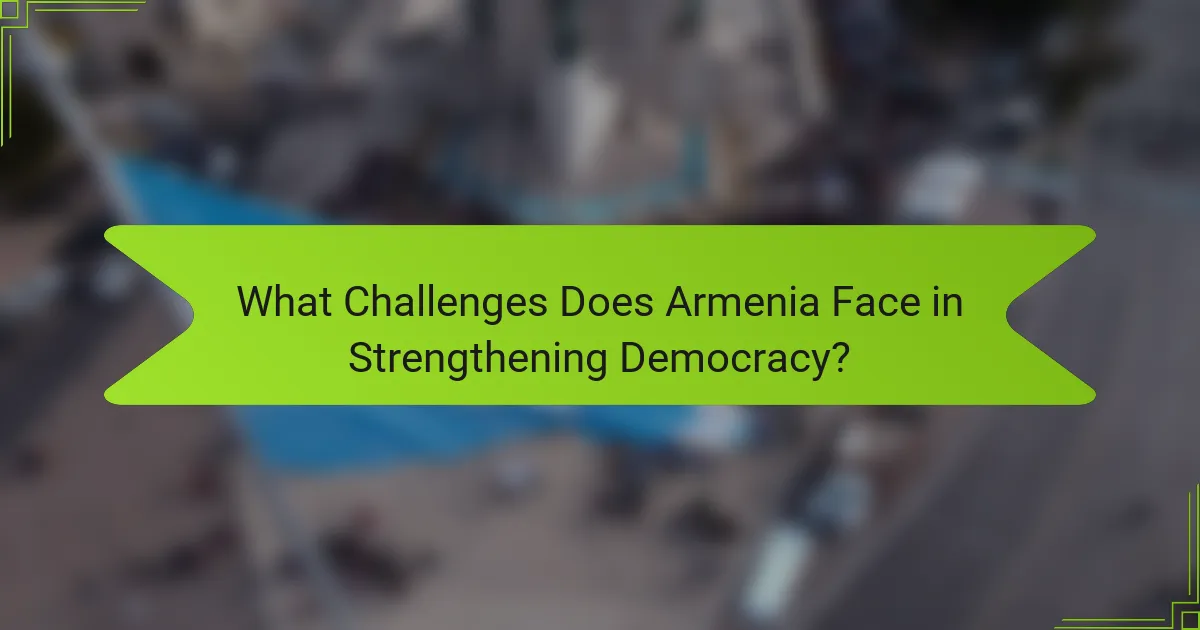The article examines the future of democracy in Armenia, focusing on recent reforms, public sentiment, and ongoing challenges. Following the 2018 Velvet Revolution, Armenia has made notable advancements in democratic governance, including electoral reforms aimed at enhancing transparency. While public support for democratic principles is strong, challenges such as political polarization, corruption, and limited media freedom persist. The article highlights the cautious optimism surrounding Armenia’s democratic trajectory, emphasizing the importance of civic engagement and international support in addressing these challenges.

What is the Current State of Democracy in Armenia?
The current state of democracy in Armenia is characterized by ongoing reforms and public engagement. Following the 2018 Velvet Revolution, Armenia has made significant strides towards democratic governance. The government has implemented electoral reforms aimed at increasing transparency and fairness. Public sentiment shows a strong desire for continued democratic progress. However, challenges remain, including political polarization and regional security issues. International organizations have noted improvements in civil liberties and political rights. Yet, concerns about corruption and judicial independence persist. Overall, Armenia’s democratic trajectory is positive but requires sustained effort to address existing challenges.
How have recent reforms shaped the democratic landscape in Armenia?
Recent reforms have significantly transformed the democratic landscape in Armenia. The government has implemented measures to enhance political pluralism and reduce corruption. Electoral reforms have aimed to ensure fairer elections and increase voter participation. The introduction of new laws has strengthened civil society and media freedoms. These changes have fostered greater public engagement in political processes. For instance, the 2021 parliamentary elections saw improved transparency and international observation. Public sentiment has shifted towards a more democratic ethos, with citizens demanding accountability. Overall, these reforms have laid the groundwork for a more robust democratic framework in Armenia.
What specific reforms have been implemented in the past few years?
In recent years, Armenia has implemented several significant reforms aimed at strengthening democracy. These reforms include changes to the electoral system to enhance transparency and fairness. The government has also introduced anti-corruption measures to improve public trust. Judicial reforms have been initiated to ensure independence and accountability in the legal system. Additionally, there have been efforts to decentralize power to local governments. Civil society engagement has been promoted to encourage public participation in governance. These reforms are part of a broader strategy to align Armenia with European democratic standards.
How have these reforms impacted political participation in Armenia?
Recent reforms in Armenia have significantly increased political participation. These reforms include the introduction of more transparent electoral processes and enhanced civic engagement initiatives. As a result, voter turnout has shown an upward trend in recent elections. For instance, the 2021 parliamentary elections saw a turnout of approximately 49%, reflecting greater public interest. Additionally, reforms have empowered civil society organizations to engage citizens more effectively. This has led to a rise in grassroots movements advocating for political change. Overall, these reforms have fostered a more participatory political culture in Armenia.
What role does public sentiment play in the future of democracy in Armenia?
Public sentiment significantly influences the future of democracy in Armenia. It shapes political discourse and impacts electoral outcomes. High levels of public engagement can lead to stronger democratic practices. Conversely, disillusionment may result in apathy towards governance. Recent protests have demonstrated the power of collective public opinion. Surveys indicate that citizens prioritize democratic reforms and anti-corruption measures. This public demand pressures leaders to implement necessary changes. Therefore, public sentiment is a crucial driver of democratic evolution in Armenia.
How do citizens perceive the effectiveness of democratic reforms?
Citizens in Armenia generally perceive democratic reforms as a positive step towards greater political representation and accountability. Surveys indicate that many citizens believe these reforms enhance their participation in governance. For instance, a 2022 poll by the Armenian National Statistical Committee revealed that 65% of respondents felt more empowered to engage in political processes due to recent reforms. However, skepticism remains among some citizens regarding the actual implementation and impact of these reforms. A significant portion, approximately 40%, expressed concerns about the effectiveness of these changes in addressing corruption. Overall, while there is optimism about democratic reforms, mixed feelings about their efficacy persist among the populace.
What are the main concerns of the Armenian public regarding democracy?
The main concerns of the Armenian public regarding democracy include political instability, corruption, and limited civic engagement. Many citizens express dissatisfaction with the effectiveness of democratic institutions. There is a prevalent fear of authoritarianism returning to power. Economic challenges exacerbate these concerns, leading to skepticism about democratic governance. A significant portion of the population believes that reforms are not adequately addressing their needs. Public trust in political leaders remains low. Surveys indicate that many Armenians feel excluded from the democratic process. These sentiments reflect a desire for more transparency and accountability in governance.

What Challenges Does Armenia Face in Strengthening Democracy?
Armenia faces several challenges in strengthening democracy. These include political instability, which undermines governance. Corruption remains pervasive, affecting public trust in institutions. Limited media freedom restricts diverse viewpoints. Additionally, the influence of oligarchs hinders fair political competition. Ethnic tensions can exacerbate divisions within society. Economic challenges also distract from democratic reforms. Furthermore, geopolitical pressures complicate Armenia’s democratic trajectory. These factors collectively impede the development of a robust democratic system.
How do political opposition and civil society influence democratic progress?
Political opposition and civil society play crucial roles in influencing democratic progress. Political opposition provides essential checks on government power. It advocates for alternative policies and holds leaders accountable. Civil society mobilizes citizens and fosters public engagement. It raises awareness on democratic issues and promotes transparency. Together, they challenge authoritarian tendencies and push for reforms. Evidence shows that countries with active opposition and civil society see higher levels of democratic participation. For instance, in Armenia, recent civil society movements have led to increased public discourse on governance. This dynamic encourages government responsiveness and strengthens democratic institutions.
What challenges do opposition parties face in Armenia’s political landscape?
Opposition parties in Armenia face significant challenges in the political landscape. These challenges include limited media access, which restricts their ability to communicate with the public. Additionally, there is often a lack of financial resources for campaigning and outreach. Political repression and intimidation from the ruling party create an environment of fear. Furthermore, electoral laws may favor the ruling party, making it difficult for opposition parties to gain seats. The public’s perception of opposition parties can be negatively influenced by state propaganda. Lastly, internal divisions within opposition parties can weaken their effectiveness and unity. These factors collectively hinder the growth and influence of opposition parties in Armenia.
How active is civil society in advocating for democratic values?
Civil society in Armenia is actively advocating for democratic values. Various organizations and movements engage in promoting transparency, accountability, and human rights. According to a 2021 report by Freedom House, civil society plays a crucial role in monitoring government actions. They organize protests and campaigns to raise awareness about democratic principles. Furthermore, surveys indicate that public trust in civil society organizations is growing. This engagement has influenced recent reforms aimed at strengthening democratic institutions. Overall, civil society remains a vital force in Armenia’s democratic landscape.
What external factors impact the future of democracy in Armenia?
External factors impacting the future of democracy in Armenia include geopolitical influences, economic conditions, and international relations. The proximity to neighboring countries, particularly Turkey and Azerbaijan, affects Armenia’s security and political stability. Economic ties with Russia and the European Union also shape democratic reforms. For instance, Armenia’s membership in the Eurasian Economic Union influences its regulatory framework. Additionally, foreign aid and investments from Western nations can promote democratic governance. Public sentiment towards these external influences varies, affecting political engagement and reform efforts. Overall, these factors collectively shape the trajectory of democracy in Armenia.
How do regional geopolitics affect Armenia’s democratic reforms?
Regional geopolitics significantly influence Armenia’s democratic reforms. Armenia’s location between major powers like Russia and Turkey creates complex dynamics. These geopolitical tensions can either support or hinder reform efforts. For instance, Russia’s influence often pressures Armenia to align with its interests, which may conflict with democratic aspirations. Additionally, the conflict with Azerbaijan over Nagorno-Karabakh diverts attention from internal reforms. This ongoing conflict affects security, leading to a focus on military rather than democratic priorities. Furthermore, Western support for Armenia can encourage democratic initiatives but may also provoke backlash from Russia. Thus, regional geopolitics shape the pace and direction of Armenia’s democratic reforms.
What role does international support play in enhancing democracy in Armenia?
International support plays a crucial role in enhancing democracy in Armenia. It provides financial assistance, technical expertise, and diplomatic backing. This support helps strengthen democratic institutions and processes. For example, international organizations have funded electoral reforms and civil society initiatives. The European Union and the United States have been particularly active in promoting democratic governance. Their involvement encourages transparency and accountability in Armenian politics. Furthermore, international support fosters public engagement in democratic practices. This engagement is essential for building a robust civil society. Overall, international support is vital for Armenia’s democratic development and stability.

What Are the Prospects for Democracy in Armenia Moving Forward?
The prospects for democracy in Armenia moving forward are cautiously optimistic. Recent reforms have aimed to strengthen democratic institutions. The government has implemented measures to enhance electoral integrity. Public sentiment shows increasing support for democratic governance. Surveys indicate that citizens prioritize rule of law and anti-corruption efforts. Challenges remain, including political polarization and external pressures. However, ongoing civic engagement suggests a commitment to democratic principles. International support may bolster Armenia’s democratic trajectory.
What strategies can be employed to foster a stronger democratic environment?
Promoting civic education is essential to foster a stronger democratic environment. Civic education empowers citizens to understand their rights and responsibilities. It encourages active participation in democratic processes. Enhancing transparency in government operations builds public trust. Transparent governance allows citizens to hold leaders accountable. Encouraging free and fair elections strengthens democratic practices. It ensures that all voices are heard and represented. Supporting independent media fosters a well-informed public. Independent media serves as a watchdog for government actions. Engaging civil society organizations amplifies community voices. Civil society plays a crucial role in advocating for democratic reforms.
How can the government engage citizens in the democratic process?
The government can engage citizens in the democratic process through various strategies. These strategies include promoting civic education, which raises awareness of democratic rights and responsibilities. Additionally, the government can facilitate public forums for discussion and feedback on policies. Implementing participatory budgeting allows citizens to have a direct say in budget allocation. Encouraging voter registration drives increases electoral participation. The government can also utilize digital platforms for outreach and engagement, making information accessible. Transparency in government actions fosters trust and encourages citizen involvement. Lastly, collaboration with civil society organizations can enhance grassroots mobilization and advocacy efforts.
What measures can be taken to ensure transparency and accountability?
Implementing measures such as regular audits and public reporting can ensure transparency and accountability. Establishing independent oversight bodies enhances scrutiny of government actions. Promoting whistleblower protections encourages reporting of misconduct. Engaging citizens through public forums fosters community involvement in governance. Utilizing technology for open data initiatives increases accessibility to information. Educating the public on their rights strengthens civic engagement. These measures are supported by international best practices in democratic governance. For example, the Open Government Partnership emphasizes transparency as a key principle for effective governance.
What lessons can be learned from other countries’ democratic transitions?
Lessons from other countries’ democratic transitions include the importance of inclusive dialogue, institutional reforms, and civil society engagement. Countries like South Africa and Chile demonstrate that negotiation among diverse political groups fosters stability. Institutional reforms, as seen in Eastern European nations post-1989, are crucial for building a functional democracy. Civil society’s role in mobilizing public support is evident in Tunisia’s transition following the Arab Spring. Additionally, addressing economic inequalities can enhance democratic legitimacy, as shown in Brazil’s experience. These lessons highlight the need for a comprehensive approach to democratic transitions.
What successful practices from other nations could be adapted for Armenia?
Estonia’s e-governance system could be adapted for Armenia. This system allows citizens to access government services online efficiently. It enhances transparency and reduces bureaucratic delays. Another practice is Finland’s education model, which emphasizes critical thinking and creativity. Adapting this could improve Armenia’s educational outcomes. Additionally, New Zealand’s participatory budgeting encourages citizen involvement in financial decisions. Implementing this could strengthen democratic engagement in Armenia. Each of these practices has demonstrated success in their respective countries, providing a framework for potential adaptation in Armenia.
How can Armenia avoid common pitfalls in democratic development?
Armenia can avoid common pitfalls in democratic development by strengthening its institutions. Strong institutions promote accountability and transparency. They help in resisting corruption and fostering public trust. Armenia should focus on enhancing the rule of law. This ensures that laws are applied equally to all citizens. Civic education is crucial for engaging the public in democratic processes. Educated citizens are more likely to participate in elections and governance. Furthermore, Armenia should encourage political pluralism. A diverse political landscape allows for healthy debate and representation. International partnerships can provide support and best practices. Countries with successful democratic transitions can offer valuable insights. Investing in civil society organizations can also promote grassroots engagement. These organizations often hold governments accountable and advocate for citizens’ rights.
What practical steps can citizens take to support democracy in Armenia?
Citizens can support democracy in Armenia by actively participating in elections. Voting in local and national elections empowers citizens to influence governance. Engaging in community discussions fosters awareness of democratic values. Joining civil society organizations strengthens advocacy for democratic reforms. Attending public forums allows citizens to voice their opinions. Educating themselves and others about democratic processes promotes informed decision-making. Monitoring government actions ensures accountability and transparency. Collaborating with international organizations can enhance democratic practices.
How can individuals participate in local governance and decision-making?
Individuals can participate in local governance and decision-making through various channels. They can attend town hall meetings to voice their opinions. Engaging in community boards allows residents to influence local policies. Voting in local elections is crucial for selecting representatives. Joining civic organizations can amplify community concerns. Participating in public consultations provides direct input on projects. Utilizing social media platforms helps raise awareness and mobilize support. Local governance structures often encourage citizen feedback on initiatives. These methods empower individuals to shape their communities effectively.
What resources are available for citizens to educate themselves on democracy?
Citizens can access various resources to educate themselves on democracy. These include government websites that provide information on democratic processes. Non-governmental organizations often offer educational programs and workshops. Libraries typically have books and materials on democratic theory and practice. Online courses from reputable institutions cover democracy and civic engagement. Community centers may host discussions and forums about local governance. Additionally, media outlets frequently publish articles and analyses on democratic issues. Engaging with these resources helps citizens understand their rights and responsibilities in a democratic society.
The main entity of the article is democracy in Armenia, focusing on its recent reforms, public sentiment, and the challenges it faces. The article outlines significant strides made since the 2018 Velvet Revolution, including electoral reforms aimed at increasing transparency, enhancing political pluralism, and promoting civic engagement. It also highlights public perceptions of these reforms, concerns regarding corruption, and the influence of geopolitical factors on Armenia’s democratic trajectory. Additionally, the article discusses the roles of civil society and political opposition in shaping democratic progress, alongside strategies for fostering a stronger democratic environment moving forward.